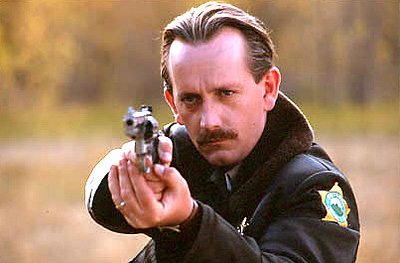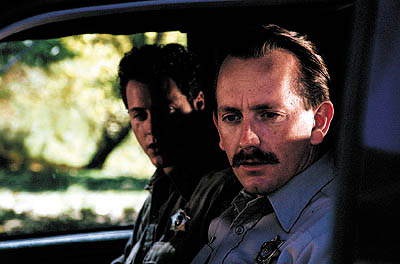

Like it or not, Richard Dutcher is becoming the voice of the Mormon church in film. His first film, God's Army, and the new Brigham City seek to portray the LDS church in positive light. Yet, this still causes ambivalence from non-Mormon audiences. This is primarily because of the preachy nature of both films and the sub-par elements. The technical aspects of the film are decent. Writer/director Dutcher can produce a film, but he still needs work in acting and writing. A murder in the small town of Brigham drives Brigham City forward.
Sheriff Wes Clayton (Dutcher) is in charge of the investigation. He is also a bishop in his local ward (a church district). This is the first murder ever in Brigham, and Deputy Terry (Matthew A. Brown, God's Army) is eager to investigate. Clayton does not want any attention brought on his town. He wants to keeps things the way they are. An additional murder brings an FBI Agent (Tayva Patch, Before He Wakes) and begins ruining the small town atmosphere of Brigham. This is a standard murder investigation, but it is not fun to follow because Dutcher leaves out critical clues to killer's identity until the very end. This way, the identity really is a surprise, but not that good. There are plenty of red herrings, identified by the intense music that randomly appears. Brigham City is simply a television movie, with a Mormon influence.
The script suffers from a gross lack of reality, even for a movie. Clayton is an extreme xenophobe. Take away the religion and give him a drawl and this would be the stereotypical South. He wants absolutely nothing to do with the murder, going as far as telling people not talk about it. It is an 'ignorance is bliss' mentality that casts a pall over his character. Later in the film he tramples over the Constitutional rights of the entire town, and only two people seem to care. He is an bad shot, a bad investigator (solving the murder is as easy as putting two pictures next to each other), and as the twist in the end shows, an incompetent sheriff. A reluctance to kill is fine, but for a policeman not to even practice is strange. Casting Brown was also a bad decision. He is not an actor. He does not express emotions well (especially rage and sadness) and stumbles over longer monologues. If he keeps this up he'll be the Casper Van Dien of Mormon movies (only homelier). They both have a blank look on their faces that convey confusion (as opposed to mystery).
The fact that the people in the film are Mormon is not a problem. Scenes that show their religious influences working in their lives are not great, but are not horrible. It is a problem that Dutcher feels the need to throw in random scenes that show the religion. It does not add anything to the story or their characters (which says a lot since Dutcher seems to feel that character development means telling their life stories), but instead wastes time. He also does not present anything in its context, leaving communion, services, and prayers wasted on non-Mormon audiences. On a brighter not, Dutcher's intentions seem earnest. This gives his films a certain honesty in their presentation. This gives him a leg up on those horrendous Christian movies from TBN.